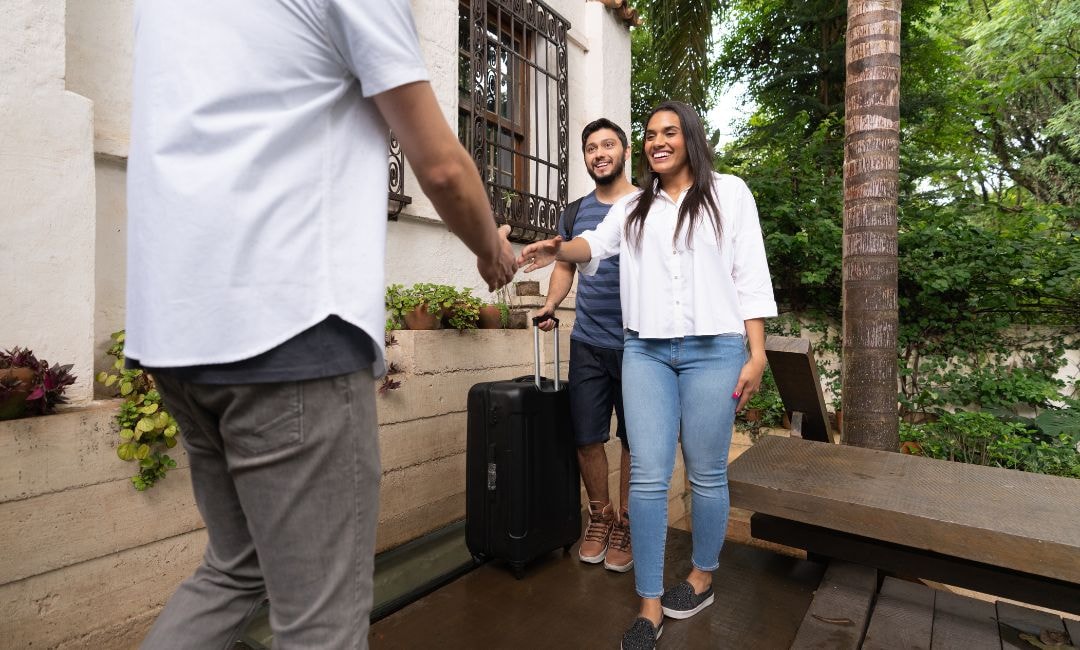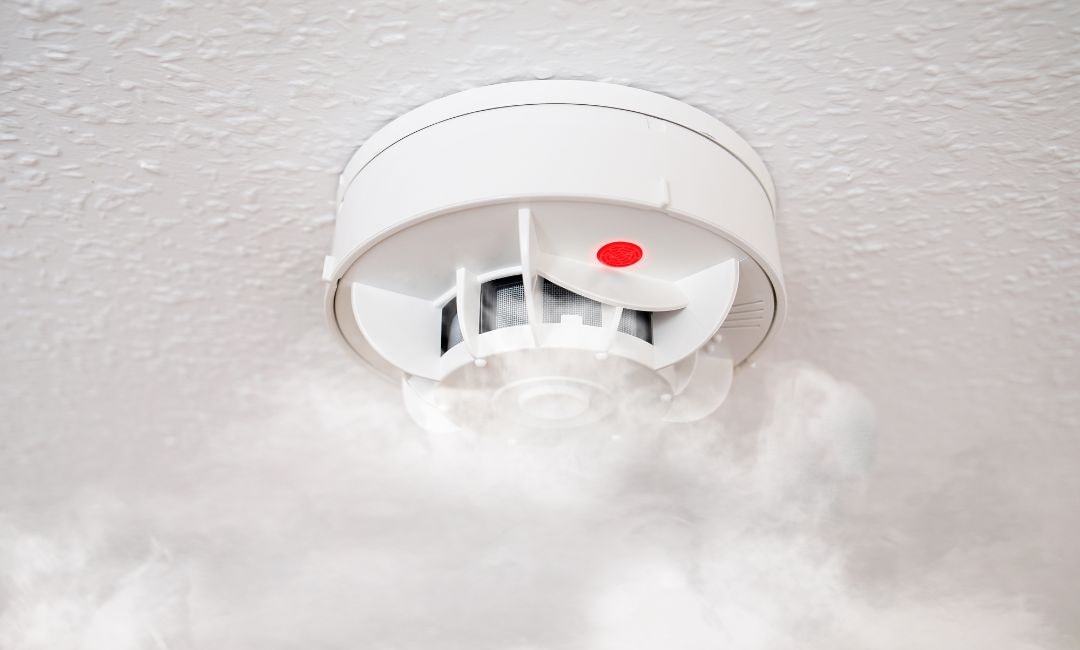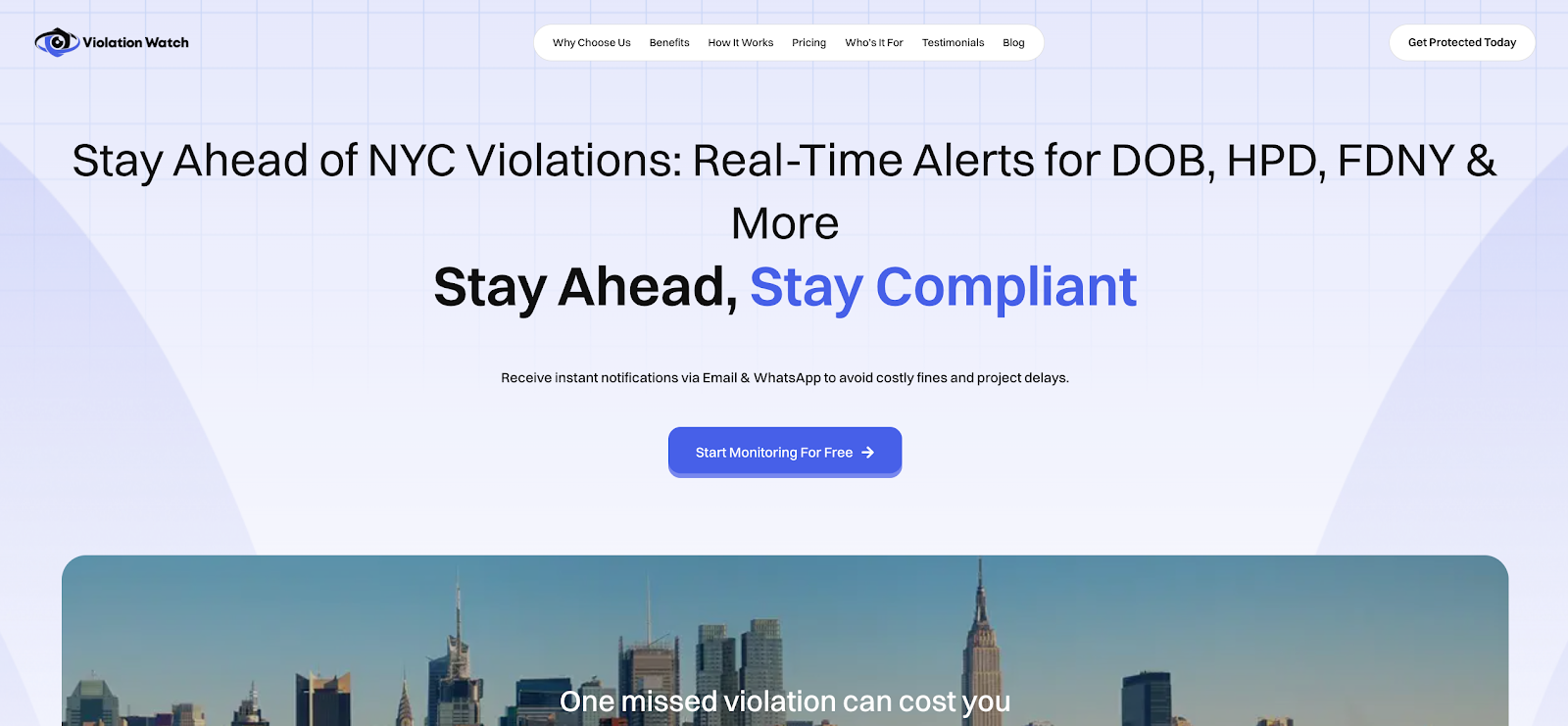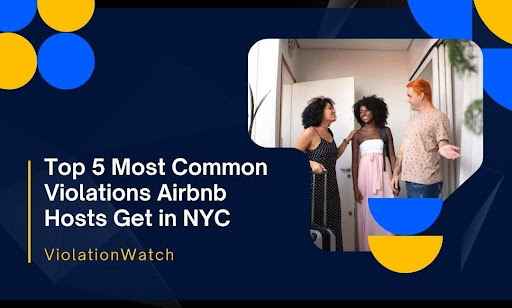Short-term rental income sounds passive—until the city shows up with a violation notice taped to your front gate. What looks like a simple Airbnb listing can trigger thousands in fines, forced inspections, or worse—disqualification from future rentals. And no, it doesn’t matter if the unit’s clean, safe, and booked solid. NYC enforcement isn’t chasing messy hosts. It’s chasing non-compliance, and it moves faster than you think.
Most hosts don’t realize how easy it is to violate local housing codes until it’s too late.
The platforms won’t warn you. Your guests won’t know. But the agencies will act.
We’re cutting through the noise.
Here’s what’s getting Airbnb hosts hit hardest in NYC—and how to stay out of that pile.
In this article, we’ll break down:
- Illegal short-term rentals (and why the 30-day rule is the line in the sand)
- Missing or incorrect Certificates of Occupancy
- Unregistered or improperly altered units
- Fire safety violations that fly under the radar—until they don’t
- Noise complaints and sanitation fines that add up fast
Each of these violations comes with its own set of traps, triggers, and repeat offender risks.
We’ll show you what to watch, how the city tracks you, and how to fix violations before they spiral.
Let’s cut the risk before it cuts into your profits.
Why Most Airbnb Hosts Get Hit with the 30-Day Rule
It sounds harmless—rent your apartment for a weekend, pocket some side income, and move on. But in NYC, that’s enough to break the law.
The 30-day rule isn’t a gray area. It’s black and white. If a guest stays for less than 30 days and you’re not physically present in the unit the entire time, you’ve crossed the line. That one detail—your presence—is what makes or breaks the legality.
What the Law Actually Says
NYC Housing Maintenance Code and Multiple Dwelling Law both block short-term rentals of fewer than 30 days unless the permanent tenant is home during the stay. This isn’t optional or open to interpretation. The law classifies these stays as “transient occupancy”, and most residential buildings are not legally approved for that use.
That means even if you own the unit, and even if the guest is respectful and quiet, the rental can still trigger a violation.
How Hosts Get Caught
You don’t need a nosy neighbor or a complaining guest to land on the city’s radar. Agencies track platforms like Airbnb, VRBO, and Booking.com. Listings are scraped, cross-referenced with building use classifications, and flagged by the Office of Special Enforcement (OSE).
Common red flags:
- Entire apartment listed with “private” entry and no mention of host staying on site
- Back-to-back bookings under 30 days
- Reviews referencing “check-in” and “checkout” processes like a hotel
- Listings in buildings zoned for permanent residence only
Once flagged, inspectors can show up unannounced. And they’re not looking for friendly conversation. They’re looking for proof of illegal use—guests onsite without the host, locks changed, furniture rearranged, or hotel-style setups.
What Happens Next
Violations tied to the 30-day rule often come with:
- DOB or HPD violations for illegal occupancy
- OSE enforcement actions
- Possible fines exceeding several thousand dollars per offense
- Orders to cease all short-term rental activity
- Risk of building-wide restrictions or penalties if it’s a multi-unit dwelling
Worse, some landlords write lease terms that ban short-term rentals entirely. That means even legal hosting while present could break your lease.
In short, the 30-day rule isn’t about the guest. It’s about the use classification of your building and your role inside it.
How a Wrong Certificate of Occupancy Can Shut Down Your Airbnb

Before a single guest checks in, NYC wants to know how the building is being used. That’s where the Certificate of Occupancy (C of O) comes in—and it’s not a formality.
It’s a legal document that defines how a property can be used: residential, commercial, mixed-use, or something else entirely. It also specifies how many units the building contains and what kind of living arrangement is allowed in each.
If you’re listing a unit that doesn’t match what your C of O allows, you’re opening the door to major violations.
What Triggers This Violation
Here’s how Airbnb hosts end up in violation:
- Listing a unit in a building with no C of O on record
- Hosting short-term guests in a space approved only for permanent residential use
- Using a basement, converted storage area, or partitioned space that doesn’t exist on the official C of O
- Advertising multiple “units” in a single-family dwelling where the C of O permits only one
Even minor changes—like a new bathroom or added kitchenette—can require a revised C of O. If you don’t file and update it, the city treats your space as non-compliant.
How the City Flags Hosts
City inspectors use multiple triggers:
- DOB cross-checks the C of O against listings found on short-term rental platforms
- Complaints from neighbors often lead to deeper inspections
- A mismatch between your listing details and what the city sees on file—number of bedrooms, entrances, or separate kitchens—raises red flags
And if the building has no Certificate of Occupancy at all? That’s a violation in itself for any post-1938 structure. You can’t fix that overnight.
The Fallout for Hosts
Penalties stack quickly if you rent out a space with the wrong C of O—or no C of O at all. You can face:
- Stop Work Orders
- Hefty DOB fines
- Possible building-wide enforcement if the unit is in a multi-family or co-op property
- Risk of liens if the violations go unresolved
For Airbnb hosts, the key issue is the use mismatch. If the certificate says long-term living and you’re running a hotel-style setup, enforcement is a matter of when, not if.
Why Altered or Unregistered Units Trigger Fast Enforcement
Not every apartment listed on Airbnb looks the same offline. Walls move. Closets become kitchens. Dens turn into extra bedrooms. These changes might boost booking rates, but in NYC, they also raise red flags, especially when the unit was never updated or registered with the city.
The Department of Buildings doesn’t overlook these details. Unauthorized alterations often create code violations, fire safety risks, or illegal density that violates zoning or housing regulations.
How Hosts Get Pulled Into This Violation
Many hosts walk into this one without realizing it. The property looks good, seems functional, and guests leave happy reviews. But the issue isn’t how the unit feels—it’s how the unit is approved.
Here’s where things go wrong:
- Renting out a subdivided unit that was never legally converted
- Installing a second kitchen or an extra bathroom without permits
- Listing basement apartments or attic conversions not approved for residential use
- Changing the number of rooms without updating the building’s official floor plan
- Failing to register units with HPD or DOB when required by law
Each of these moves turns a legal unit into a non-compliant one. The moment a guest enters that space, you’ve crossed into illegal occupancy territory.
How the City Detects These Issues
Inspectors don’t need a walkthrough to spot problems. They compare your listing photos to existing floor plans and building filings. If your Airbnb shows a two-bedroom layout but the city’s records only show one, you’re exposed.
Common inspection triggers include:
- Fire Department calls
- DOB audits
- Tenant or neighbor complaints
- Active investigations into short-term rental activity in the building
And once a violation is issued, correcting it usually requires permits, architectural plans, and possibly even removing the alteration.
What It Means for Airbnb Hosts
This type of violation can escalate quickly. You’re now dealing with:
- DOB violations for illegal construction
- HPD or FDNY citations, depending on the nature of the alteration
- Required filings and permit fees
- Mandatory removal or legalization of the changes
- Delays in rental operations or full shutdown orders
The risk multiplies if you’re managing multiple units or operating in a rent-stabilized building. A single improperly altered unit can trigger audits of the entire property.
The Overlooked Fire Safety Issues That Get Airbnb Hosts Fined

Most guests won’t ask where the fire exits are. But NYC will. Fire safety violations don’t always look obvious, yet they’re one of the fastest ways to land on the FDNY’s radar, especially when short-term rentals are involved.
Whether you’re renting out a walk-up in Brooklyn or a studio in Midtown, the city expects every space used for overnight stays to follow strict fire codes. Hosting without meeting those codes opens the door to serious fines and potential shutdowns.
What Fire Safety Rules Actually Apply
In NYC, fire safety compliance covers more than smoke alarms. You’re required to maintain and, in some cases, install:
- Working smoke and carbon monoxide detectors in every sleeping area
- Unobstructed exit paths—no locked or gated windows, blocked hallways, or double-keyed deadbolts
- Sprinkler systems or fire-rated materials, depending on the building size and layout
- Emergency lighting or signage in multifamily dwellings
- Fire extinguishers in appropriate locations
If your listing looks or operates like a hotel, fire safety rules become even tighter.
How Airbnb Hosts End Up in Violation
This violation usually isn’t about bad intentions—it’s about missing details. Hosts might assume a regular apartment setup is safe enough. But guest use changes the rules. That space is now considered transient, and the city inspects it as such.
Hosts often get cited for:
- Missing or expired detectors
- Installing the wrong type of detector (wrong placement, not interconnected, or battery-only in hardwired buildings)
- Blocked fire escapes or windows with fixed security bars
- Illegal partitions that break the fire code
- Listing apartments in buildings not zoned for transient occupancy without proper safety retrofits
These issues add up quickly, especially in older or less rigorous building types where retrofitting is difficult and oversight is tighter. Even a single missing device can lead to a violation. And if multiple guests are staying in an unprotected layout, the risk and the fine rise.
How These Violations Are Triggered
FDNY inspections can stem from:
- A 311 complaint
- A reported fire or triggered alarm
- Cross-agency enforcement with DOB or HPD
- Inspections during broader sweeps of suspected short-term rental activity
Once the inspector arrives, the checklist kicks in. They don’t stop at one problem—they issue violations for every infraction they find.
The pressure is amplified when Airbnb argues that it shouldn’t be treated like the hotel rates it undercuts. But in NYC’s view, any transient lodging needs to meet safety standards—pricing models don’t change the rules.
What Hosts Face
Fire safety violations carry real weight. Hosts can expect:
- Summonses with escalating fines
- Required fire safety corrections before legal use can resume
- Possible vacate orders in severe cases
- Increased scrutiny across other units or floors
Failing to address one violation can lead to compounding penalties. In a worst-case scenario, it can also affect insurance coverage or liability in the event of an emergency. The city sees every improperly equipped unit as part of the broader housing shortage problem. And as listings plunge in response to tighter enforcement, hosts without proper systems are the first to feel it.
How Guest Behavior Turns Into Costly Noise and Sanitation Fines
Some violations don’t come from what you build or list—they come from what your guests leave behind. Noise complaints and sanitation violations are two of the most common reasons short-term rentals catch city attention. They start small: a late-night gathering, trash piled outside the wrong door, or food waste left behind after checkout. But in NYC, those small issues can lead to agency investigations, formal violations, and repeat enforcement.
Why Noise Complaints Matter More Than You Think
Airbnb guests treat a rental like a temporary bubble. Neighbors don’t. Tenants in rent-controlled buildings, co-ops, or tight multifamily walk-ups often file complaints when they see or hear something that doesn’t fit the norm.
Here’s what usually triggers enforcement:
- Guests talking loudly in common areas or hallways
- Music or party noise after 10 p.m.
- Frequent guest turnover creates a hotel-like atmosphere
- Entry buzzers are used late at night or early in the morning
- Increased foot traffic in buildings not zoned for transient use
Complaints are filed through 311, which routes noise issues to the Department of Environmental Protection (DEP) or NYPD, depending on severity. Enough reports lead to official documentation—and that’s often how investigators learn short-term rentals are happening at all.
In fact, special enforcement announced new tracking programs to flag buildings with repeat disturbances tied to short-term rentals.
Where Sanitation Violations Come In
Trash tells on hosts. Whether it’s overflowing garbage bins, food containers dumped in the wrong collection zone, or missed pickup days, sanitation issues create a paper trail.
Most fines are issued for:
- Trash put out on non-collection days
- Garbage bags blocking sidewalks or entryways
- Recyclables mixed with regular waste
- Guests leaving large amounts of refuse not properly bagged or sorted
- Rats or pests spotted near bins tied to guest activity
The Department of Sanitation (DSNY) can issue multiple violations in a single sweep. And if your building starts to gain a reputation for short-term rental trash, they won’t wait for another 311 complaint—they’ll start monitoring proactively.
What Hosts Risk
Noise and sanitation issues might sound minor compared to DOB or FDNY violations. But they’re often the gateway violations that start a chain reaction.
Expect:
- Escalating fines for repeat offenses
- Investigations by HPD or DOB triggered by 311 complaint patterns
- Pushback from building management or neighbors
- Potential eviction or lease termination in buildings with rental restrictions
For Airbnb hosts, managing guest behavior matters as much as managing the listing itself. NYC’s new wave of other laws and new rules around short-term rentals increasingly requires hosts to think beyond their listings and consider how Airbnb’s presence affects the broader building.
When a host’s listings draw attention, the city’s response is quick and getting stricter. NYC dropped its hands-off approach long ago. Now, what starts as a trash complaint could end with your unit flagged in enforcement data alongside home-sharing apps in other cities facing similar pressure.
If Airbnb claims to support community standards, then hosts need systems to meet them, before Airbnb’s sued become the next headline.
How to Stay Ahead of All 5 Violations Using ViolationWatch

Airbnb violations don’t show up all at once—they build up silently. A missed filing here. A neighbor complained there. By the time the city posts a notice, you’re already behind.
That’s where ViolationWatch changes the outcome. It doesn’t just help you react—it helps you stay ahead.
Step 1 – Add Every Property You Manage
First, map out your risk. ViolationWatch lets you register each NYC address you operate or oversee. One unit or fifty—doesn’t matter. You can group properties, tag them, and assign specific monitoring rules by building or portfolio.
This step alone brings visibility. No more checking multiple agency sites. No more flipping between DOB, HPD, ECB, and FDNY databases. If it’s happening at one of your locations, it’s captured in one spot.
And when the city starts enforcing restrictive home-sharing regulations more aggressively, you’ll already be covered.
Step 2 – Let the Platform Monitor What the City Tracks
Once your properties are in, ViolationWatch starts working. It syncs directly with NYC violation feeds and enforcement sources. If DOB posts a construction violation tied to an illegal alteration—or if HPD flags an occupancy issue—your dashboard updates instantly.
This includes short-term rental triggers like:
- New or reopened 311 noise complaints
- DOB status updates related to illegal use
- HPD housing maintenance violations linked to sanitation or overcrowding
- OSE investigations tied to transient rentals
It also helps you catch red flags tied to illegal rentals—whether that’s due to a locked door inside apartments, unapproved conversions, or patterns that look like an illegal hotel to inspectors.
You’re not guessing anymore. You’re tracking exactly what inspectors and enforcement teams are watching.
Step 3 – Get Alerts Before It Becomes a Fine
Every new violation, complaint, or update sends a real-time alert. WhatsApp and email notifications go out to every user you’ve assigned—whether that’s your property manager, compliance officer, or legal team.
The alerts cover:
- Unit-level issues, like blocked fire exits or missing smoke detectors
- Portfolio-wide concerns, like zoning mismatches or certificate violations
- Hearing dates, status changes, or reopened cases
This is especially useful for larger rental buildings where a single bad listing—or a unit operated by rogue Airbnb hosts—can trigger building-wide scrutiny.
It cuts lag time between the city’s move and yours. The result? Faster responses. Fewer surprises.
Step 4 – Act Early, Not After the Deadline
Violations in NYC escalate when they go ignored. Fines grow. Legal risks rise. The more you delay, the harder it is to resolve cleanly.
ViolationWatch gives you the time advantage. With everything centralized—property records, violation histories, document uploads, and status changes—you can act fast.
That means:
- Fixing flagged alterations before the DOB inspection
- Responding to sanitation issues before DSNY re-inspects
- Clarifying Certificates of Occupancy before the violation becomes a stop order
- Catching noise complaint trends before they become HPD investigations
If you’re managing multiple units and the listings follow a typical Airbnb arrangement, the city sees that as giving guests unrestricted access, which triggers enforcement under the short-term rental rule.
By monitoring across buildings, ViolationWatch helps you avoid patterns that the mayor’s office, NYC officials, and the city’s office are targeting to protect permanent housing and preserve New York City’s housing stock.
This isn’t theory. This is how the city works now. If you’re running Airbnb rentals, staying compliant doesn’t happen by chance—it requires tools that match how fast NYC cracks down.
Staying Compliant in NYC Is Easier for Short-Term Rentals with the Right Tools
Hosting in New York City comes with more strings than most realize. But now you know what actually gets Airbnb operators fined—and how fast it can spiral if left unchecked. That’s not just useful. That’s a clear edge.
You’re no longer guessing which violations carry weight. You’ve seen how the city enforces the 30-day rule, flags improper Certificates of Occupancy, cracks down on unregistered unit changes, and builds cases off noise or trash reports. You’ve also seen how those enforcement patterns overlap—and how smart tracking changes the game.
Here’s what we covered and what it means for you:
- Illegal short-term rentals tied to the 30-day rule are the most common—and avoidable—Airbnb violations in NYC
- Certificate of Occupancy mismatches can disqualify your unit before a single guest arrives
- Unauthorized alterations or unregistered layouts lead to serious DOB enforcement and fines
- Fire safety oversights like blocked exits or missing alarms are easy to overlook—and expensive to fix after the fact
- Noise complaints and sanitation violations open the door to deeper inspections and repeat penalties
What happens when you stay ahead of all five? You lower the risk. You protect revenue. You stay off the city’s radar. That’s what ViolationWatch makes possible. One dashboard. All your properties. Instant alerts before things go sideways.
For Airbnb hosts operating in NYC, it’s not about playing defense—it’s about knowing what’s coming next. And when local law shifts or a new law lands, being proactive helps you stay compliant before enforcement hits.
Smart systems matter—especially when NYC Airbnb enforcement targets registered hosts, permanent resident rules, and occupancy patterns that the hotel industry tracks closely. It only takes one unit, operated by the same person, to trigger a fine—or worse, enforcement that hits double the national average. In a market shaped by Airbnb research, changing policy, and increasing oversight, keeping your city home in compliance isn’t optional. It’s operational.

